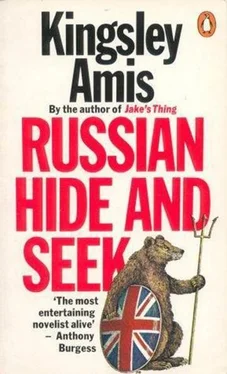Kingsley Amis - Russian Hide-and-Seek
Здесь есть возможность читать онлайн «Kingsley Amis - Russian Hide-and-Seek» весь текст электронной книги совершенно бесплатно (целиком полную версию без сокращений). В некоторых случаях можно слушать аудио, скачать через торрент в формате fb2 и присутствует краткое содержание. Жанр: Современная проза, на английском языке. Описание произведения, (предисловие) а так же отзывы посетителей доступны на портале библиотеки ЛибКат.
- Название:Russian Hide-and-Seek
- Автор:
- Жанр:
- Год:неизвестен
- ISBN:нет данных
- Рейтинг книги:3 / 5. Голосов: 1
-
Избранное:Добавить в избранное
- Отзывы:
-
Ваша оценка:
- 60
- 1
- 2
- 3
- 4
- 5
Russian Hide-and-Seek: краткое содержание, описание и аннотация
Предлагаем к чтению аннотацию, описание, краткое содержание или предисловие (зависит от того, что написал сам автор книги «Russian Hide-and-Seek»). Если вы не нашли необходимую информацию о книге — напишите в комментариях, мы постараемся отыскать её.
A handsome and highly sexed young Russian cavalry officer, Alexander Petrovsky, joins the plot and learns to his regret that politics and playmates don't mix.
"Funny, cynical, captivating-Amis makes an implausible situation almost believable, then lets his characters worry their way out." (B-O-T Editorial Review Board)
Russian Hide-and-Seek — читать онлайн бесплатно полную книгу (весь текст) целиком
Ниже представлен текст книги, разбитый по страницам. Система сохранения места последней прочитанной страницы, позволяет с удобством читать онлайн бесплатно книгу «Russian Hide-and-Seek», без необходимости каждый раз заново искать на чём Вы остановились. Поставьте закладку, и сможете в любой момент перейти на страницу, на которой закончили чтение.
Интервал:
Закладка:
At the gravel-dashed front of the 1920s villa that housed his men, the troop office and the non-security stores, Alexander inquired of his sergeant whether there was anything to report. There was not; there never was. Then, having handed the mare over to his orderly, he went on foot to the main house, informed his squadron commander of his return to duty and asked if there were any special orders. There were none; there never were any. The rest of the morning passed inspecting the men’s quarters, visiting the horse-lines, completing forms for the commissary, drinking tea and gossiping with the sergeant and one of the corporals, and finally doing something that was out of the ordinary and yet routine, making the monthly check of the security stores. Accompanied by the sergeant, a burly Latvian called Ulmanis, he again went to the main house, picked up from the orderly room an authorisation signed and dated by the adjutant and made his way to the reinforced door to the basement lift. Here a sergeant of Field Security and a sentry were stationed side by side. The sentry covered the arrivals with his pistol while the Security sergeant examined first Alexander’s identity-card, then the authorisation. At his nod, the sentry lowered his firearm, Alexander and Ulmanis turned their backs and the Security man pressed a row of numbered buttons in a sequence that was changed daily. The door slid aside. In the armoury it took the two visitors twenty minutes to establish that everything in the racks appertaining to the troop concerned, 8 Troop, was as it should have been. It was; it always was. As soon as the inspection was completed, Alexander followed standing orders by returning the authorisation to its source.
At 1430 hours Sergeant Ulmanis paraded the troop and reported all present and correct to Alexander. They numbered just twenty: one officer, one sergeant, one artificer-sergeant, four corporals, four under-corporals and nine troopers, the ninth being Alexander’s orderly, who was told off to remain in the office. The orders to mount, to proceed to the right and to march were successively given and obeyed. In their rough dark-grey undress uniforms and dull-yellow cross-belts 8 Troop were not a showy sight, but a trained eye would have noted the relaxed carriage of the riders and the fit condition of their mounts. Such an eye, or its owner, might also have noted the unusual composition of the small force: apart from those of the headquarters group, every riding-horse had attached to it a pack-horse, in each case a Cleveland cross-thoroughbred put back to a Welsh cob, specially trained to carry a heavy load across rough ground. Their burdens today were not quite what they would have been in action, but they were of identical weight and distribution. Breast-girths and cruppers kept the packs in place even at full gallop.
The party moved at a walk out of the main gateway, along the road and down a series of lanes for some kilometres; an unfamiliar stretch of terrain was required for the intended exercise, one not used in the same way before. Eventually Alexander, in the lead, reached a high point, raised his hand to signal a halt and passed the word for sub-section leaders. The eight NCOs dismounted and came forward.
‘You see that church?’
‘Yes, sir.’ ‘Yes, your honour.’ They saw it.
‘Good. Remember, anybody caught using a road goes straight on register. Sub-sections to the right extend in open order and await my signal. Double time.’
Very soon afterwards eight pairs of guardsmen were strung out twenty-five metres apart along the top of a grassy slope. Alexander, at the extreme right of the line, blew a loud blast on his whistle and they were away downhill at the gallop, the pack-horses not trailing the riding-horses but, as they had been schooled to, moving up level on the left-hand side for an improved field of view. It might have been thought that a glance at the map would have justified a couple of minutes’ delay, and certainly it might have been hoped (at least by the senior officers concerned) that a glance and more than a glance would precede any such move in a real engagement, but excitable, highly-competitive young men, confident of their proficiency and eager to show it off, are not famous for looking at maps at the outset of a steeplechase. But, again, this steeplechase was still a useful activity, fostering that sine qua non for any sort of cavalryman, eye for ground, as well as the peculiar capacities required for piloting two horses at once.
The slope was gentle and became gentler, perfect for a vigorous gallop, but Alexander pulled back behind the two pairs on the right flank, Sub-Section A and Sub-Section B, recognisable by their chestnut horses as much as by their position. When a troop of this category was carrying out the present exercise, it fell to the troop officer to keep an eye on the performance of the sub-sections on this side, so far as he could, while the artificer-sergeant covered the centre and the troop sergeant the left. His real reason for staying in the rear, however, was not this. A single, unencumbered horse and a rider of his own adequate abilities and excellent sense of direction were bound to beat any pair to the objective, a victory that even he (as some might put it) would find hollow. So, denied what he would have really liked, a fair or less unfair overall race, he prepared as always to devise a series of small races in which he would try, successfully for the most part, to beat a selected pair to some minor landmark a couple of hundred metres ahead, then hang back again to handicap himself for the next round with a different pair. It was hard to distinguish this pattern of behaviour from that of a conscientious officer watching his men closely but without interference or fuss; none of Alexander’s men had ever managed to. In the same sort of way, his simple love of playing soldiers made him take those men out of camp whenever possible and meant that he was good at devising tests of skill, initiative and endurance – games, in fact. As a result, 8 Troop’s physical fitness, state of training and general morale were unsurpassed in the regiment, even by the showpiece 1 Troop; it would be strange if they had not valued their officer for those benefits. The army, with all its outlets for childish interests, its elevation of them into rules of behaviour, had been an excellent choice of career for Alexander Petrovsky.
The ground became level, then rose a to a crest. The whole troop was spread out on the further slope in brilliant sunshine, making towards a long plantation of poplars, the sub-sections on the left keeping a straight path with their pack-horses already dropping back into line behind the ridden horses for the passage through the wood, those on the right swinging out to round its corner. From the crest to that corner it was something over three hundred metres. Alexander pushed his blunts into Polly’s sides and made off at top speed on a transverse course towards a point to the right of the wood which, he estimated, would just allow him room to overtake the sub-sections moving that way. The going was ideal here, short turf, level surface, dry but not baked hard; he was soon coming up fast. As their paths converged, he saw the corporal of S-S A glance over his shoulder, grin at him, turn to his left and shout something to his partner, who grinned too and nodded vigorously. A bare ten metres short of the invisible winning-post Alexander considered he was in front by a head and slowed to a canter.
The wood was evidently thicker than had appeared from the top of the slope, and those who had elected to go through it instead of making the detour had lost ground; at any rate the field was now well scattered, from front to rear as well as laterally. Along the foot of the hill ran a road with thick hedges on both sides. As Alexander approached, he saw the four grey horses belonging to S-S D – the under-corporal’s rangy gelding was unmistakable – jump the nearer hedge beautifully, almost together, then be pulled to a halt before the much higher further one. Perhaps the NCO would defy the rules and move along the road in search of a gap or a part low enough to be safely jumped; no, without hesitation he and his mate drew their sabres, leaped to the ground and began slashing away at the obstacle. (They were called sabres out of piety; they were more like heavy knives, part of the men’s stock of tools and other devices designed to help them in a most important aspect of their function in combat, the speedy crossing of rough terrain.)
Читать дальшеИнтервал:
Закладка:
Похожие книги на «Russian Hide-and-Seek»
Представляем Вашему вниманию похожие книги на «Russian Hide-and-Seek» списком для выбора. Мы отобрали схожую по названию и смыслу литературу в надежде предоставить читателям больше вариантов отыскать новые, интересные, ещё непрочитанные произведения.
Обсуждение, отзывы о книге «Russian Hide-and-Seek» и просто собственные мнения читателей. Оставьте ваши комментарии, напишите, что Вы думаете о произведении, его смысле или главных героях. Укажите что конкретно понравилось, а что нет, и почему Вы так считаете.












